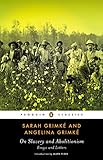On Slavery and Abolitionism / Sarah and Angelina Grimké ; introduction by Mark Perry.
Material type: TextLanguage: English Series: Penguin classics | Penguin classicsPublisher: New York : Penguin Books, 2014Description: xvi, 331 pages ; 20 cmISBN:
TextLanguage: English Series: Penguin classics | Penguin classicsPublisher: New York : Penguin Books, 2014Description: xvi, 331 pages ; 20 cmISBN: - 9780143107514 (paperback)
- 0143107518 (paperback)
- Works. Selections
- Grimké, Sarah Moore, 1792-1873 -- Archives
- Grimké, Angelina Emily, 1805-1879 -- Archives
- Antislavery movements -- United States -- History -- 19th century -- Sources
- Slavery -- Moral and ethical aspects -- United States -- History -- 19th century -- Sources
- Women's rights -- United States -- History -- 19th century -- Sources
- Women abolitionists -- United States -- Archives
- Abolitionists -- United States -- Archives
- Quakers -- United States -- Archives
- Abolición de la esclavitud -- Historia
- Movimiento antiesclavista -- Historia -- Estados Unidos -- Siglo XIX
- Esclavitud -- Historia
- Abolicionistas -- Estados Unidos
- Derechos de las mujeres -- Historia -- Estados Unidos -- Siglo XIX
- Cuaqueros -- Estados Unidos
- 326/.8 23
- 002 E 449 G863o 2014
| Item type | Current library | Home library | Collection | Shelving location | Call number | Copy number | Status | Date due | Barcode |
|---|---|---|---|---|---|---|---|---|---|
 Libro
Libro
|
Biblioteca Juan Bosch | Biblioteca Juan Bosch | Recursos Regionales | Recursos Regionales (2do. Piso) | 002 E 449 G863o 2014 (Browse shelf(Opens below)) | 1 | Available | 00000121693 |
An Epistle to the Clergy of the Southern States (1836) -- Letters on the Equality of the Sexes, and the Condition of Woman (1837) -- Slavery and the Boston Riot (Letter to William Garrison in The Liberator [1835]) -- An Appeal to the Christian Women of the South (1836) -- An Appeal to the Women of the Nominally Free States (1837) -- Letters to Catherine M. Beecher, in Reply to an Essay on Slavery and Abolitionism, Addressed to A.E. Grimké (1838) -- Address to the Massachusetts Legislature, February 21, 1838.
"A collection of historic writings from the slave-owner-turned-abolitionist sisters portrayed in Sue Monk Kidd's novel The Invention of Wings. Sarah and Angelina Grimke's portrayal in Sue Monk Kidd's latest novel, The Invention of Wings, has brought much-deserved new attention to these inspiring Americans. The first female agents for the American Anti-Slavery Society, the sisters originally rose to prominence after Angelina wrote a rousing letter of support to renowned abolitionist William Garrison in the wake of Philadelphia's pro-slavery riots in 1935. Born into Southern aristocracy, the Grimke's grew up in a slave-holding family. Hetty, a young house servant, whom Sarah secretly taught to read, deeply influenced Sarah Grimke's life, sparking her commitment to anti-slavery activism. As adults, the sisters embraced Quakerism and dedicated their lives to the abolitionist and women's rights movements. Their appeals and epistles were some of the most eloquent and emotional arguments against slavery made by any abolitionists. Their words, greeted with trepidation and threats in their own time, speak to us now as enduring examples of triumph and hope"-- Provided by publisher.


There are no comments on this title.